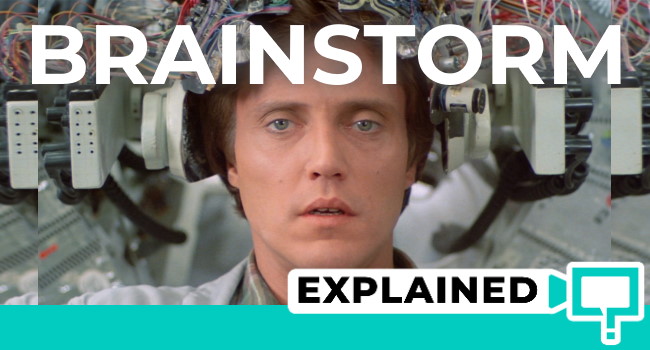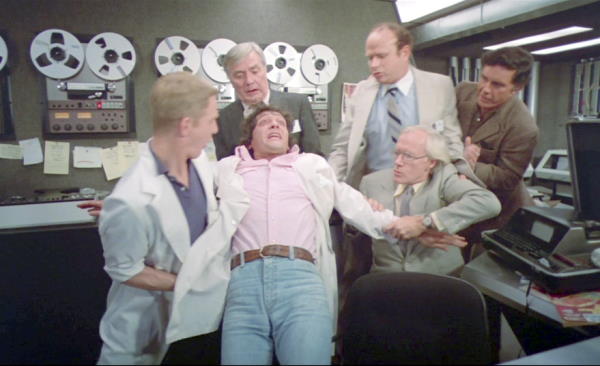Brainstorm is a 1983 science fiction psychological thriller directed by Douglas Trumbull. The film revolves around a group of scientists who create an immersive device that allows one to experience another person’s memories. The concepts portrayed in this film are ingenious, and the movie, in general, is far ahead of its time. The film has an excellent cast and has Christopher Walken, Natalie Wood, Louise Fletcher, and Cliff Robertson in leading roles. If you feel like catching up on an old film, this one is great. Here’s the plot and ending of the 1983 movie Brainstorm explained; spoilers ahead.
I was recommended this movie by Suni Sanchez, and after I watched it, we had an excellent discussion. This article is a reconstruction of our conversation. Thanks again, Suni!
Hollywordle – Check out my new Hollywood Wordle game! Where To Watch? To find where to stream any movie or series based on your country, use This Is Barry’s Where To Watch. Oh, and if this article doesn’t answer all of your questions, drop me a comment or an FB chat message, and I’ll get you the answer. You can find other film explanations using the search option on top of the site.
Brainstorm Movie Explained: Answers to the Film’s Pressing Questions
Brainstorm Movie: The Premise
Michael and Lillian are scientists working on a device that can make one person experience being in the mind of another. They achieve their initial round of success and celebrate. The party-poopers are a department in the milliary that has been funding them and are keen on weaponizing the invention. Lillian is terribly disappointed that their CEO, Alex, is okay with this heinous idea. As one would expect, this leads to a tug of war with tonnes of clashes, both internal and external. However, Brainstorm is not a science fiction film focusing solely on the power struggle. There are many layers to this film.
Michael is currently in a relationship with Lillian, the lead researcher, and his marriage with Karen is coming to an end. The device enables not only witnessing another’s memories but experiencing their feelings. It’s like the Point-Of-View gun from Hitchhiker’s Guide To The Galaxy and causes Michael and Karen to rekindle their relationship. Lillian, who has been having acute anxiety issues, succumbs to a heart attack. Before dying, she wears the device leaving behind a recording her experience of death.
Michael is shut out of his lab by Alex for not complying, and this leaves Michael with two life goals – be the first man to experience the most feared thing on this planet (death) and ensure the device never gets into the hands of the military (Project Brainstorm). With the help of his wife and friends, he accomplishes just that.
Here are the profound questions that are raised by Brainstorm (and Suni).
What actually happened to Hal who stole, and cut, the ‘porno’ experience?
I believe Hal experienced ecstasy in a way no human has before. Hal extracted and looped orgasm and caused a sensory overload. Hal didn’t care for the girl or the fantasy, but the experience left him feeling like a new man. It made him realize that he has a beautiful life, but he was just not seeing it. In the slang of today, he is Woke!
It’s all about a bit of perspective; that’s all it takes to see the bright side of things. For some people, this occurs when they experience a near-death event, and for Hal, it was looping orgasms. But in both cases, it’s not the physical event but the experience of the mind.
What exactly happened to Michael’s son when he saw that scary recording? Why did he have a full-on psychotic episode from that?
That recording was secretly made by the military department while putting someone through psychological torture. When the kid wore the headgear, he experienced psychological torture on his mind. Luckily, Michael got there in time to unhook him. The kid made it alive because he experienced the event for a short moment, and any longer would have fried his mind.
Why did Michael not experience what his son did?
The kid’s lack of experience to take off the headset caused it. When Mike first experienced the recording of torture, he was quick to remove the headset because he’s seen many recordings and is in control of his mind enough to take off the headset.
Project Brainstorm: Who made the torture recording?
It was a military recording made to torture other people as badly as they wanted without inflicting any physical damage. They weaponized the invention for their needs to torture at scale a group of prisoners, spies, and anybody they wanted to extract information from. They called this Project Brainstorm.
How could Michael experience death without dying? We see in the movie that they changed some settings, which ones?
Lillian died of a heart attack. This means her brain was fine, but her heart stopped pumping blood, and this caused her repertory system to get overloaded as the lungs supply oxygen to the blood that is kept in motion by the heart.
Michael disconnected his heart and lung functions from the machine, and this allowed him to experience only what Lillian’s mind experienced without his heart and lungs reacting the way hers did, causing her death. The other scientist, Gordy, failed to do this, so he experienced what Lillian did – a full-blown heart attack. That’s why Gordy dies.
How could Michael still have the visuals despite disconnection of other body functions?
It’s not visuals; Michael is simply experiencing what Lillian did but with the rest of his body functions unaffected. But even that turned out to be near-fatal in the end because Michael’s mind begins slipping into a coma.
The death experience at the end wasn’t just beautiful, in my opinion – was a point to make: that we go back to the stars (the cosmos) after we die?
I believe the experience was depicted as beautiful because the movie chose not to make death sound like the most terrible thing. It wouldn’t have done well for the film considering the bad taste that it would have left. Besides, Michael has this content smile on his face, which gives us the sense that he’s eventually experiencing something sublime.
Does Michael go to the stars in the ending of Brainstorm, or does he go beyond?
Going up in the film Brainstorm appears to be a metaphor for going up to the heavens among the stars. The machine recorded what Lillian’s mind experienced, and this is her brain’s interpretation of death, not a universal fact about death.
Would Michael have gone somewhere else if Karen hadn’t called him back?
Like we’re told in the movie The Matrix, the body cannot survive without the mind. So yes, if Karen had not called out to Michael, his mind would have accepted death, and he would have become a vegetable with his mind lost in a digitally induced coma.
Did he genuinely experience the afterlife as Lillian had in real life through the heart attack? Or was that his own interpretation of a subjective experience?
I believe it was Lillian’s interpretation rather than Michael’s. He only experienced what she did. Sadly, Mike could simply go out like a light when it’s his time.
What was Lillian’s goal for this device? It is clear that she didn’t want it to be militarised nor used for the sex industry, but what would have been her ideal use?
I think Lillian wanted the invention to be used for peace. This is technically a point of view machine, and if one leader saw the point of view of another, they might just get each other.
From the initial phrases Alex uses, he keeps saying, “breakthrough in communication”. That as humans, we can use more than mere words to communicate and express. Every time Alex mentioned that, Lillian was delighted. So I think it might be fair to assume that she agreed with him.
What are the ethics of the military guys deciding what to do with a device like that? Who’s invention is it really?
Alex is the CEO but is looking for funding from the military, which means they have a say in the research’s direction. But Alex’s key researchers are not in agreement, so he arranges a backdoor for the military to monitor and advance their own research based on Michael and Lillian’s work. Looks like the ethics went out of the window soon as they entered the scene.
Brainstorm Movie Ending Explained
The ending of the movie shows Michael successfully experiencing what Lillian’s mind experienced when she died. Lillian perceived her death as ascending to the stars. Michael’s mind was slipping into a digitally induced coma but is brought back because Karen calls out to him and reminds him of his promise to her – to not leave her again. They also successfully hack-in and destroy everything back at the lab thwarting the militarisation operation of the invention.
What did you think of the plot and the ending of Brainstorm? Do leave your comments and questions below!

Barry is a technologist who helps start-ups build successful products. His love for movies and production has led him to write his well-received film explanation and analysis articles to help everyone appreciate the films better. He’s regularly available for a chat conversation on his website and consults on storyboarding from time to time.
Click to browse all his film articles






